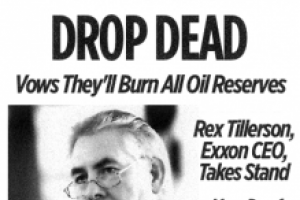Refinery Safety Campaign Frays Blue-Green Alliance
CounterPunch
 Aside from California’s obedient Republican congressional delegation, Stanford is perhaps the most powerful locus of Trump’s support in the state with close ties to the energy industry and its lobbyists, the center of an even more powerful web of connections to Donald Trump, whose administration has moved to help industry in general, and Big Oil in particular—doing away with climate and environmental protections, opening public lands up to mining and drilling, and so on.
Aside from California’s obedient Republican congressional delegation, Stanford is perhaps the most powerful locus of Trump’s support in the state with close ties to the energy industry and its lobbyists, the center of an even more powerful web of connections to Donald Trump, whose administration has moved to help industry in general, and Big Oil in particular—doing away with climate and environmental protections, opening public lands up to mining and drilling, and so on.
 Rex Tillerson stands a good chance of being confirmed as Secretary of State. His statements about climate change adaptation, whether, hubris, ignorance, or deception talking-it's a dangerous view. It's playing with other people's lives. So why does Rex Tillerson want a job that could easily be seen as a step down in power and influence? He has unfinished business, particularly in Russia, which he likely does not trust the Trump administration to handle.
Rex Tillerson stands a good chance of being confirmed as Secretary of State. His statements about climate change adaptation, whether, hubris, ignorance, or deception talking-it's a dangerous view. It's playing with other people's lives. So why does Rex Tillerson want a job that could easily be seen as a step down in power and influence? He has unfinished business, particularly in Russia, which he likely does not trust the Trump administration to handle.
 Did you know that some of the fruits and veggies out on supermarket shelves are grown using wastewater from oil and gas operations? For the past several years, many drought-stricken farms in California’s Central Valley, which produces 40 percent of the nation’s fruits and vegetables, have been increasingly irrigating their crops with wastewater. Chemicals present include 16 the state classifies as carcinogens or reproductive toxicants, says EWG report.
Did you know that some of the fruits and veggies out on supermarket shelves are grown using wastewater from oil and gas operations? For the past several years, many drought-stricken farms in California’s Central Valley, which produces 40 percent of the nation’s fruits and vegetables, have been increasingly irrigating their crops with wastewater. Chemicals present include 16 the state classifies as carcinogens or reproductive toxicants, says EWG report.
 On the morning of February 18, 2015, the ExxonMobil oil refinery in Torrance, California exploded, causing chemical ash to rain on the surrounding community for hours. Eight workers had to be decontaminated and four were sent to hospitals with minor injuries. With new evidence that the explosion could have been much worse, and that other aging refineries around the country are also at risk, scientists, industry watchdogs and a few lawmakers are sounding an alarm.
On the morning of February 18, 2015, the ExxonMobil oil refinery in Torrance, California exploded, causing chemical ash to rain on the surrounding community for hours. Eight workers had to be decontaminated and four were sent to hospitals with minor injuries. With new evidence that the explosion could have been much worse, and that other aging refineries around the country are also at risk, scientists, industry watchdogs and a few lawmakers are sounding an alarm.
Spread the word